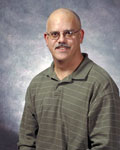A decade’s worth of self-penned economics lessons edified through modern technology is now available in a convenient college textbook.
 Bert Barreto and Frank Howland, professor and associate professor of economics at Wabash College, respectively, started team-teaching econometrics (statistical analysis for economists) 10 years ago. They futilely searched for a textbook they could use in their classes.
Bert Barreto and Frank Howland, professor and associate professor of economics at Wabash College, respectively, started team-teaching econometrics (statistical analysis for economists) 10 years ago. They futilely searched for a textbook they could use in their classes.
"They all, at that time, were dominated by dry equations with lots of Greek letters," Howland said. "They tried to cover way too much. And some of them were also very sloppy in their presentation."
So the professors started whipping up their own handouts, complete with examples.
"Gradually the handouts accumulated, our examples multiplied and the big component was we were both fans of spreadsheets, in particular Microsoft Excel," Howland said. "We learned about its capabilities, and that it was possible to control the way the spreadsheet appeared using these macros (a single computer instruction representing a sequence of instructions), and that we could write Monte Carlo simulations using these macros. We gradually started getting all the material, and saw that other people weren’t doing this. We eventually started thinking maybe we should write a book."
They did. It’s called "Introductory Econometrics," published in January by Cambridge University Press. Besides compiling all their lectures, the textbook features a CD-ROM with Excel workbooks, enabling students to work Monte Carlo simulations with simple clicks of a mouse. Monte Carlo, for the uninitiated, is a technique for obtaining an approximate solution to certain mathematical and physical problems, typically involving the replacement of a probability distribution by sample values. The Excel workbooks, Barreto and Howland said, are the textbook’s principal innovation.
 "It’s a much more visual presentation, much more interactive," Howland said. "Most textbooks contain lots of charts and graphs, but those are dead on the page. With the Excel workbooks, the student can view the chart, change a key parameter and see how the chart itself would change. That allows active learning."
"It’s a much more visual presentation, much more interactive," Howland said. "Most textbooks contain lots of charts and graphs, but those are dead on the page. With the Excel workbooks, the student can view the chart, change a key parameter and see how the chart itself would change. That allows active learning."
"Introductory Econometrics" also is geared more toward economic neophytes.
"This book is an attempt at a niche in the market, in that it’s truly introductory," Barreto said. "There are many other good books out there, but they’re very sophisticated and very complicated. We’re taking a shot at a true, sort of sophomore who’s maybe had statistics, but not an advanced student. And it doesn’t have a lot of the mathematical jargon, formulas and expositions that other books have."
In addition, Barreto and Howland have an instructors’ resource on the Wabash College Web site that’s for free use. Barreto also wrote a Monte Carlo add-in, where someone can write something unrelated to econometrics. It’s also free, though they’re asking people to give them credit if they use it.
It’s still too early to tell how the textbook will be judged by peers. Because of its January release, it was too late to be adopted in any spring semester curriculums, though it has been picked up by Penn State University-Erie. The professors are getting feedback, however.
"I don’t think there’s any exaggeration we get e-mails from all over the world, because the Internet is one amazing creature," Barreto said. "I believe it’s either going to really do well or nothing. There’s no in between, because it is very different and we’re just two regular guys at a little school in the middle of nowhere. We don’t have an army of graduate students to take the course and use the book when they become professors."
Regardless of how "Introductory Econometrics" is received, Barreto and Howland have found its years of accrued research a valuable resource in their own classrooms.
"We aren’t the most efficient people," Barreto said of the textbook’s time span. "But I think the work is sort of battle-tested. We’ll come up with an example, give it to our students and if there’s anything wrong we’ll fix it. Once you polish something for 10 years, it shines."
 Coggeshall is a reporter for the Crawfordsville Journal Review. This story appeared in that publication, April 7.
Coggeshall is a reporter for the Crawfordsville Journal Review. This story appeared in that publication, April 7.